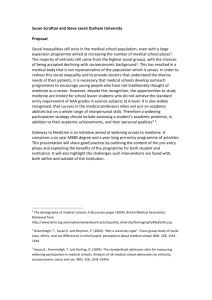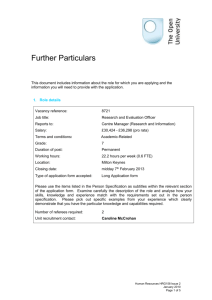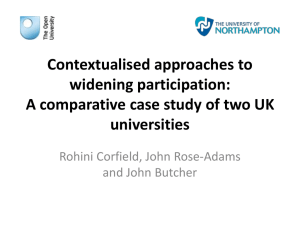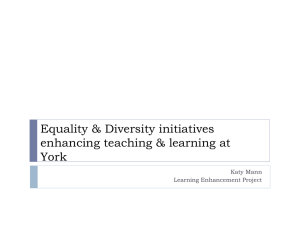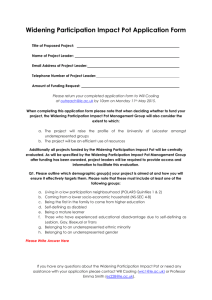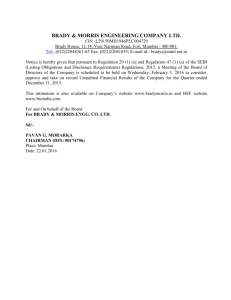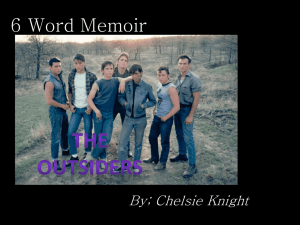Moldaw - Etruscan Press
advertisement
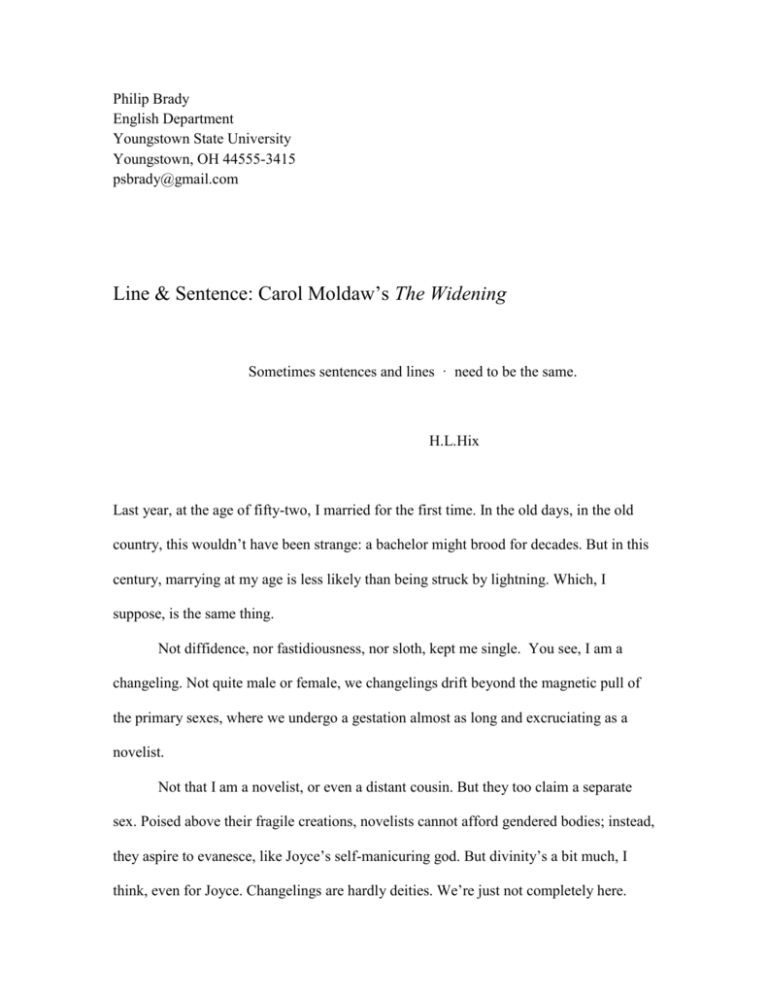
Philip Brady English Department Youngstown State University Youngstown, OH 44555-3415 psbrady@gmail.com Line & Sentence: Carol Moldaw’s The Widening Sometimes sentences and lines · need to be the same. H.L.Hix Last year, at the age of fifty-two, I married for the first time. In the old days, in the old country, this wouldn’t have been strange: a bachelor might brood for decades. But in this century, marrying at my age is less likely than being struck by lightning. Which, I suppose, is the same thing. Not diffidence, nor fastidiousness, nor sloth, kept me single. You see, I am a changeling. Not quite male or female, we changelings drift beyond the magnetic pull of the primary sexes, where we undergo a gestation almost as long and excruciating as a novelist. Not that I am a novelist, or even a distant cousin. But they too claim a separate sex. Poised above their fragile creations, novelists cannot afford gendered bodies; instead, they aspire to evanesce, like Joyce’s self-manicuring god. But divinity’s a bit much, I think, even for Joyce. Changelings are hardly deities. We’re just not completely here. Brady—Line and Sentence This musing about sex has been brought on by a new book, The Widening, by the poet, Carol Moldaw. A novel, she calls it, and I’ll take her at her word. Written in lightning-quick vignettes from an interior third-person point of view, The Widening follows an unnamed female protagonist through a painful adolescence. From the memorable first sentence, “At the crucial moment she said yes,” through 148 pages of scrutiny, The Widening reveals the power and vulnerability of new womanhood in the crucible of the sexual revolution. To say that this book is about sex is true, and also completely wrong—not because it isn’t. But saying a book is about sex implies a prurience, which is a brand of purity achieved when bodies are pressed together and portrayed, so that boundaries are made clear. This is the mission, I’m informed, of the pornographer. Intent on objectivity, the pornographer—or more gently, the eroticist— steps behind a lens, opening a space from which the intimacies of the gendered can be framed. Of course, to us changelings, all novels revel in smut. Vanilla, kinky, gay, trans— no matter. They’re all subtitled; “Skin, Bound”; their theme: Skin Bound Seeks Release. The urge’s thwarting twists into a plot. Are novels inherently lurid? We of the tertiary gender nod our heads. And in this light I wonder if Carol Moldaw’s lapidary offering is a novel at all. Remarkably ascetic when it comes to flesh, she never steps behind a verbal camera to register perspective. Each chapter—and given that the longest is 300 words, ‘chapter’ seems a big-shouldered label—distills a moment; each is discrete, their cumulative power deriving from the pattern of drift, like motes across a field of vision. Against the edifice 2 Brady—Line and Sentence of the novel, these light-spots dance elusively, never quite coalescing into anything as conventional as a plot. Maybe The Widening isn’t a ‘Skin-Bound’ production after all. Yet, the illusion of narrative conjured by these chapters flows like a field of energy over the sole character’s outline. Her age is sixteen-eighteen. She wears hiphuggers or a drab dress. A ring is slammed over her knuckle; then chained under her blouse. There are bedrooms; backpacks; dorms; a trip through Spain; a journal violated; cigarillos; moderate weight gain; nipples bitten and licked; semen swallowed; and a nose, unbobbed. We know these things in the immediacy in which they are received. And while the character is sole in the sense that hers is the only mind we enter, other voices purport to define her: wealthy parents, shrinks, and a murder of boys, all acting as stimulants, irritants, agents of action or occasions of reflection. They engorge; they flay. But none attains characterhood. Ultimately, these forces crystallize into two adjectives that ring like a pair of slaps— “privileged” and “promiscuous.” As a teen, I was not promiscuous. We changelings aren’t neuter, though. Inside our hulls, desire occillates so fiercely we can fritz out like a TV screen. And in that cone we hive. Sight, we do not miss. Bright tinctures swirl; shapes loom and dissolve, prescient beyond the solar world. Nor do we lack touch, self-caressed. For music— there’s tinnitus. What we lust after is simply to be desired. For us, every gendered body is privileged. The prime-gendered tend to take their flesh for granted, assuming it is universally bestowed. We know better. Occasionally, desire drives a changeling to elbow the glass hatch, crack it open, and gain weak purchase among the binary. The rest stay spooned at the birth portal. Either way, I’m not sure what is forged out of such incubation. But now that I’m married, I feel invited to wonder. 3 Brady—Line and Sentence Maybe I was born a changeling. I was a blue baby, whisked from the womb and sequestered in a glass tube to be transfused. Two weeks I lay in a hospital chrysalis, quilled with IV’s, while fluids of diverse flavors coursed through veins, pulsing to cure my urge to swim back. Even today, when I set my sleep machine to ‘surf,’ I feel the pull of exsanguination. Or perhaps my nature waxed more slowly. It was no widening, my childhood: growth was relentless, but only in one direction. I spindled upward, but gained no more mass than a slinky. Fearing the skyward sprawl, I folded my limbs and tried to seed. But soon my toes sprang beyond my lips, and I had to wave them goodbye forever. Yearning to scuttle home through the beaker’s neck, I hummed, scrawled, chanted, mewed. At the school bus stop, I gripped my book bag’s handle and spun like an umbrella. Assigned to the back row, I crafted my fingers into boats and canoes, undulating to the distant drone of nuns. Then I scurried home to spell the dark, devout as an Aztec, by rocking on hands and knees in front of the cabinet hi-fi. Back and forth, haunches to palms, I rocked. And rocked. Squinching my eyes shut, I soared over the streets of Flushing, and out over the parkways of Long Island. Every plunge backward was met by the thud of spongy flesh on bone, spurring the next thrust forward. My heels kept me from regressing any further than Montauk, but I could embody an oceanic voyage, finding in repetition a charm against time’s surge. Rocking, I discovered lines. Dripping with afterbirth, these tensile entities selfconceived, foamed a few beats, and welcomed their own ebb. Soon, I began to see them everywhere: on cereal boxes and store windows, on cans and baseball bats and t-shirts— even inscribed in the exhausts of acrobatic airplanes. They weren’t sentences 4 Brady—Line and Sentence diagrammed by nuns or spewed by newsmen. Lines might grace paper, but pages didn’t shape them. Each had its own axis: iamb of upturned face, caesura of stretched sinews, the ache of denouement, punctuated by a ‘huh’ that triggered the next line. Each bar modulated the last and next. And within each, such nuances: the spine’s arch, angle of toe and knuckle, cant of head; every couplet devising its own signature. Carol Moldaw did not subtitle The Widening ‘A Prose Poem’. A poet of considerable powers, she may have been tempted. The chapters display the texture and poise of stanzas. The voice is liquid, untethered to persona, gliding through amniotic air like my fingers’ sea-craft. Moldaw dives into sensation, then surfaces to map new constellations. But the paradox of the prose poem—this, she eschews. “If they’re lines, why string them out?” I imagine her demanding. What are prose poems, anyway? Can they rock? Or do their sentences force them to crawl? Have they tumbled from meter into matter? Or do they entwine, partaking of both? Maybe genres are not determined by conventions any more than arms are defined by sleeves. Is Walden a prose poem? Remembrance of Things Past? One morning, I could no longer rock. As I sank to my heels, pain shot through my legs. Adolescence, it seemed, had been unraveling my bones until femur unlatched tibia. Osgood schlatter’s syndrome, they diagnosed, snuffing out my final attempt to retard maturity. By eighth grade, I had sprouted to mannish height, but was as cranky as an arthritic squeezebox. And I started to read novels. Novelists. Changelings they may be, but they don’t crouch at the nub. Their craving glues them to the glistening pane, even if the glare blinds them. Our tribe is suspicious, but we’re grateful too. We need novels. How else can we learn the manners 5 Brady—Line and Sentence of the binary? With their compound eyes, novelists observe the fetid, and we study their findings the way a Texan tourist might swat for a Japanese tea ceremony. We’ve seen all the stunts: epistle, maguffin, yarn, frame—and realisms minimal, maximal and magical. So The Widening’s warped contours don’t baffle. Let there be longer ellipses. Let the voice be enigmatic as a Pharaoh. Let chapters suffer more radical truncation. Let The Widening be engulfed. That is the way of the novel, isn’t it? To engulf other forms? So says Citizen Bahktin. Let there be paragraphs, chapters, sections, sequels. Stamp them like malls. Package them as smartly as Burger King dispatches the rain forest. As for the voice, that’s an old dodge, “the unreliable narrator.” If the scenes are fragmented and the secondary characters flat, isn’t that the point? It’s Skin Bound in the sublunary. The author? Poof! I can almost taste a whiff of irony in the cobalt smoke. But wait. The girl in The Widening seldom speaks. The sparse dialogue is italicized, embedded in description. The girl is not the narrator. So whose voice are we listening to? And if The Widening isn’t a novel or a prose poem, what could it be? If I had knees, I might rock the answers loose. Carol Moldaw could have dubbed The Widening a memoir. That’s a popular choice these days. I don’t have the dope on her personal life, and can’t say if the events chronicled are sufficiently autobiographical to pass the Oprah test. Clues can be sleuthed from the paperback: bio, PCIP, blurbs, promo pic. The author falls within the target age group, the correct gender. She attended Harvard, the locale of part of the novel; she grew up in California, the protagonist’s home. And the young girl is a budding poet, as the author is a mature one. Something, perhaps, to go on. But not enough. 6 Brady—Line and Sentence Maybe it’s the memoir, not the novel, that engulfs. Maybe we see through the façade of fiction the way a shrink sees through the patient who says, “I have this friend with a problem.” Chinua Achebe thought so. He raged against Heart of Darkness, claiming that Marlow was nothing more than Conrad’s mouthpiece. What got under Achebe’s skin, I think, is the notion that a world—or in this case, Africa—could be constructed from outside, and that a novelist could evade the consequences of living in his fabrication. Achebe knew those consequences all too well: Africa shriveled to the lobe of a Euro-brain. Rapping on the window safeguarding Conrad from his “unreliable narrator,” Achebe bellowed, “There are no changelings. There are only men and women, and betrayal.” Before I hit on the idea of marriage, I plotted for years to acquire a prime gender. One ploy was a memoir. That’s the way in, I thought. Memoirists are tattooed with sex; they reek hormones. When people talk about the gulf between memoir and fiction, that’s what they mean. It doesn’t have much to do with imagination: memoirists make up almost as much stuff as novelists do. The difference is that memoirists stand bowel-deep in the stench of their own creations. Of course, I’d been writing for years—in lines. Though my carcass was so weedy that on rainy days I was almost two-dimensional, I could still feel the sensation of rocking. But lines did nothing to help me achieve a prime gender. Even hemmed on pages, they distorted scale, marring every perception with an infinitesimal vastness. I pinched my nose, strapped on a toolbelt, and pegged To Prove My Blood at the top of page one. Meaty stuff, sentences. Their syntax cuts a wide swath. I tried to plow straight, but couldn’t help a little sway and wobble. Sometimes the apparitions which 7 Brady—Line and Sentence animated my rocking took solid form for a moment, but they soon receded to ciphers filing through a congruent history. Sentences draped the proscenium of my family’s emigration from Ulster to Brooklyn and beyond. I pressed on, drafting my father—how he rumbled through wartime France liberating wine cellars and landed in New York to join the Police Force. At last, I interred the whole family between covers. But no matter how closely I hued to the brawn of their lives, my sentences still slanted. I never did achieve a prime gender. Hovering over any memoir is the threat of betrayal. Not just betrayal of family secrets. As an anti-personnel device, a novel can be just as effective. The betrayal consists of translating flesh into sentences. Somehow, lines don’t feel so treacherous. Constantly refreshed, they don’t pave over the unknowable; they elude the diminishment of scale which results from justified margins. For instance, If Carol Moldaw had written The Widening in lines, no one would demand that the identity of the speaker be certified, or wonder how deeply her story paralleled the author’s. Betrayal is a central theme in The Widening. Classmates pass scandalous rumors; others leer and snicker. One is reproved with a slap; another expelled from a tryst. The girl feels betrayed by the loss of control over her own depiction. Her body inspires untrustworthy desire. These betrayals coalesce in the second accusation she faces: that she is “privileged.” By most standards, the protagonist is privileged: born to wealth, sent to private school, touring Europe before attending Harvard. Yet privilege brings about the deepest betrayal. Joining her daughter on one leg of her Spanish tour, the prim, brittle mother rummages in the girl’s backpack and reads her journal. Worse still, she bottles the secret 8 Brady—Line and Sentence until they return home, where she disgorges the sordid details to her husband, who confronts the heroine with its unsavory revelations. As a novelistic device, ‘the journal’ is in the changeling rolodex under ‘sub-text,’ reminding that The Widening is a portrait of the artist as a young woman. It is the equivalent of Stephen Dedalus’s villanelle on dappled clouds. Of course, the difference is that we hear Stephen’s villanelle directly. Scoured of tone and feeling, the girl’s journal is reduced to a father’s tirade. But I find myself dwelling on the journal as artifact, not mere devise. Was it written in lines? Was it lyrical? Revelatory? Explicit? Does it exist, dormant in an attic of Carol Moldaw’s house? I imagine her climbing the stairs at night, retrieving the yellowed pages, rereading words long ago betrayed. Was writing the novel a way of reclaiming the lines of the journal? Is this absent text, of unknown character and depth, the means whereby The Widening gains novelistic girth? Is it here that the unnamed central character of the novel and the author, Carol Moldaw, speak as one? The memoir wasn’t my only scheme to gain a prime gender. It’s true that my recent marriage is my first, but I’ve been a father for years, and I have two dozen offspring, with eleven more on the way. Prolific? Not really. In the changelings’ version of fatherhood, I have become a publisher. We do not conceive, of course, nor watch over birth. Still, in some ways it might be said that we stand at the portal and usher beings into the world. A year ago, in an airport, with time to kill, I reached into my knapsack for another submission, and pulled out a thin sheaf titled, THE WIDENING. By the time I’d finished the manuscript—almost missing my plane—I felt almost embodied, even unique. I was 9 Brady—Line and Sentence the only stranger who had read this book. And I could act as the agent by which this lost journal and found novel entwined: assisting at the rebirth of lines first betrayed, then redeemed by sentences capable of recalibration, rocking backward, invested with thrum and cadence. That day at the airport, and in many re-readings since that day, whether I begin with chapter one, or open at a random stanza, I felt and feel the nearness of the absent line, the absent journal, and the ineluctably absent—and present—author. I don’t care what genre The Widening claims. It’s the reader, not skin, not the novel or memoir, who finally engulfs. It’s a risky thing to challenge Achebe, the mighty Biafran Laureate, especially when he speaks for the voiceless against privilege. But don’t we all resist reduction to a personal identity? Don’t we all hearken to an indeterminate seed? This is the desire which crazes novelists—not to distance themselves from the world, but to plumb their own embryonic core. It’s a desire which crazes sentences themselves, causing them to dip backward on their syntactic joints and hinges. No seaworthy sentence lacks rondure. And The Widening—couldn’t that title hint at something wider than a single budding womanhood? Could it point toward the dissolution of these provisional boundaries of genre, and even perhaps, boundaries of skin? Maybe it is the widening, not the novel or the memoir, or even the reader, which engulfs. Maybe our desire for embodiment surges backward as well as forward, each arc broadening to dip deeper into the dark. We sentence not merely to embody, or to elude embodiment. Entwined in lines, sentences express our yearning not only to be seen, but to be seen into. My wife comes from a cove far south of Montauk. She too once stood in the surf, squinting until the horizon forgave its line. Instead of rocking, she sang; giving voice to 10 Brady—Line and Sentence the myriad tones of sea and sky. Even today, she shivers in the lightest breeze, and if she doesn’t pay attention, she lists seaward. But if you heard her sing you’d know why I miss my knees. Her voice may be rocking’s primum mobile. We live far from the ocean. And though my gendered incarnation moves in only one direction, I am content. Some restless nights, though, I steal out of our bed and climb the stairs and reach up to the highest attic shelf. I always look behind to be sure I’m safe and alone, then I pull it down—an old knapsack, like the one I imagine contains The Widening’s journal. Unknotting the cord, I reach inside up to my elbow, and remove a long sleek skein of sealskin. I unfurl it, run my fingers over the cowl’s edge. I bring it to my face and taste the sea. I wrap it around my naked body, and feel the long perfect lines of a body of water. My wife, you see—my beautiful human wife—was born a silkie. 11

